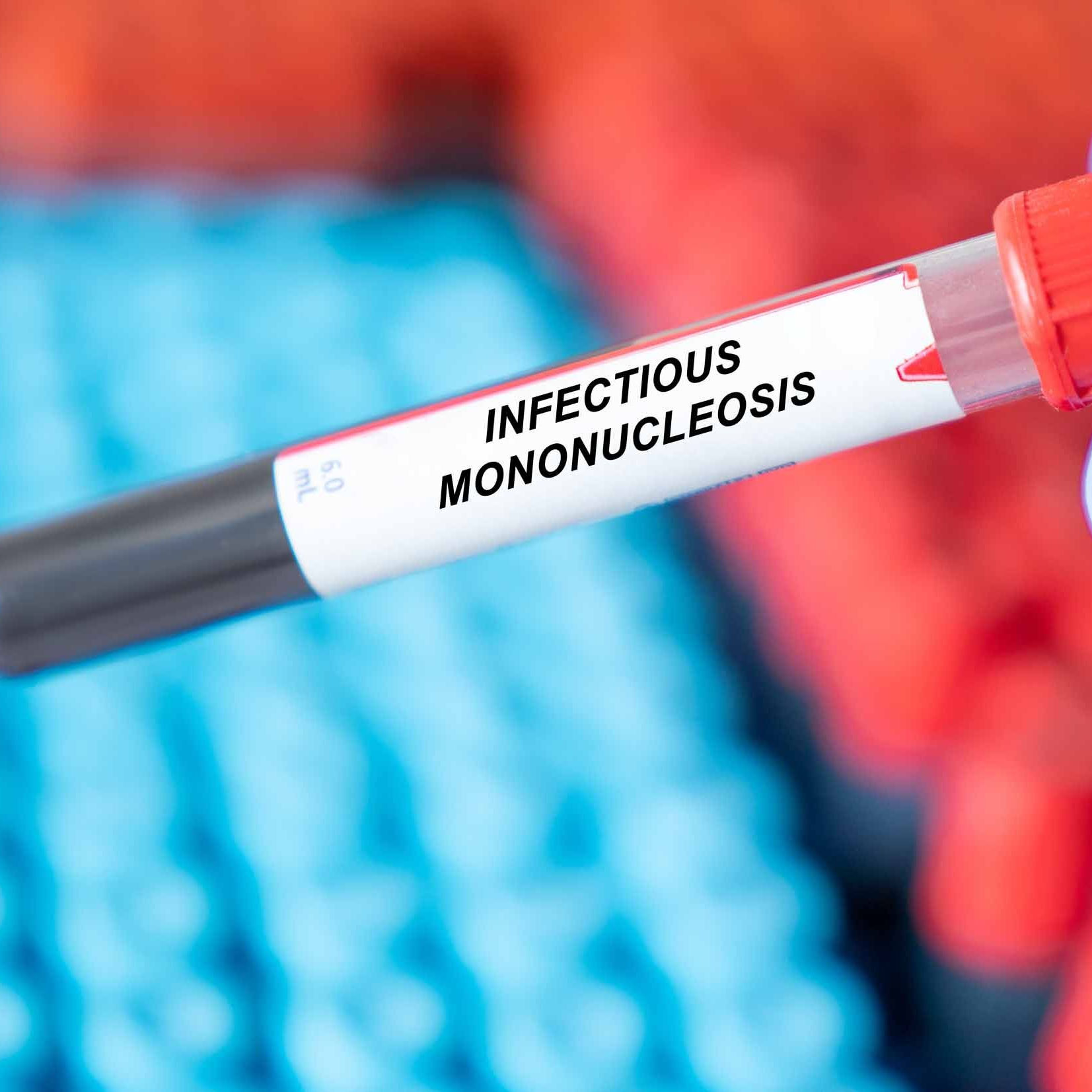
What is mononucleosis?
Infectious mononucleosis is also known as Pfeiffersche glandular fever ( ). It is caused by the Epstein-Barr virus, which belongs to the human herpes viruses. These viruses are highly contagious. The viruses are spread all over the world and the infection rate of mononucleosis is correspondingly high . On average, 90 % of people under 30 are infected with the virus and up to 95 % by the age of 40.
How is mononucleosis transmitted?
The transmission of the human herpes viruses that are responsible for mononucleosis are mainly transmitted via saliva, which is why mononucleosis is also called the kissing disease. Infection is particularly common among young children, as they often put their toys in their mouths at kindergarten and then exchange with each other. The younger, particularly "kiss-active" group of people is also at risk. Far rarer, but still possible, is the route of infection via blood transfusions, organ donations and sexual intercourse.
How long is the incubation period for mononucleosis?
The period between infection and the appearance of symptoms is quite long in mononucleosis. The incubation period is about four to six weeks. However, it is also possible for three months to pass before the first symptoms become noticeable. During this time, many infected people already infect other people because they have no idea that they have contracted mononucleosis.
How long is a person contagious with mononucleosis?
The virus is passed on particularly easily when a person is freshly infected, because in this phase the person excretes an enormous number of pathogens in their saliva. Even a long time after the symptoms have disappeared, the pathogens are still excreted. For this reason, it is advisable to reduce kissing during the first months after an initial infection and to refrain from unprotected sexual intercourse .
Once you have had mononucleosis, that person remains a carrier of this virus for the rest of their life. A healthy immune system can control the pathogens very well so that the disease does not break out again. But people with a weak immune system are at risk for mononucleosis breaking out again and showing symptoms. That is why everyone who has had mononucleosis is contagious in phases, even if they do not have any symptoms.
What are the symptoms of mononucleosis?
Typical symptoms of mononucleosis are very severe sore throats, including an enormous reddening of the throat mucosa. In addition, there is pronounced discomfort when swallowing. Further symptoms are:
As a rule, those affected recover within two weeks. However,
in many cases, the listlessness, fatigue and general feeling of illness
persist for weeks. Sometimes
these complaints put a lot of strain on the psyche.
Another symptom is the swelling of the spleen. This organ plays an essential role in the entire defence against diseases and has the task of filtering dead blood cells out of the blood. During the course of the disease of mononucleosis, the spleen is particularly challenged. It swells strongly and not infrequently ruptures, which makes immediate treatment necessary.
How is mononucleosis diagnosed?
It is not easy to diagnose mononucleosis without a doubt, because precisely the symptoms such as fever, sore throat and swelling of the lymph nodes also occur with simple colds. This is also a reason why mononucleosis is diagnosed late or not at all . Doctors usually only check for mononucleosis when the fever does not go down, the patient feels fatigued for weeks and the throat inflammation does not subside.
In order to be able to diagnose mononucleosis with certainty, an examination of the blood is indispensable. The specific antibodies against the Epstein-Barr virus can be detected in the blood without a doubt. Increased liver values and increased leukocytes are also found in this infection. Only in rare cases is a tissue sample necessary.
How is mononucleosis treated?
Since mononucleosis is a viral disease, antibiotics are not helpful. The treatment of mononucleosis depends solely on the symptoms:
- In case of pain or fever, it is advisable to take ibuprofen or paracetamol after consulting the doctor.
- Physical rest is essential, preferably bed rest.
- Strict prohibition of sports.
- Sufficient fluid intake to avoid dehydration of the body.
- Avoid fatty foods and alcohol.
Should complications arise, further therapies may be necessary. In some cases, the swelling of the pharyngeal mucosa is so severe that hospital treatment is necessary, to prevent choking. If a ruptured spleen occurs, the affected person must be operated on immediately or risk bleeding to death.
What is the prognosis for mononucleosis?
In most cases, mononucleosis subsides after two or three weeks without lasting consequences. In extremely rare cases, the disease becomes chronic, which means that the symptoms last for months or even years. Only rarely does severe meningitis or inflammation of the liver occur, resulting in permanent damage .
As a rule, infected patients are immune to mononucleosis for life after the symptoms have subsided. In immunocompromised persons, for example after organ transplants, it is quite possible for the disease to break out a second time with symptoms .
How can mononucleosis be prevented?
The pathogen that causes mononucleosis is so widespread that the infection rate is about 95 %, so it is hardly possible to protect oneself from the disease. So far, there is no vaccination, but research is being carried out. Ideally, people should avoid contact with infected persons.
Is there an obligation to report mononucleosis?
According to the Infection Protection Act, there is no obligation to report mononucleosis.
